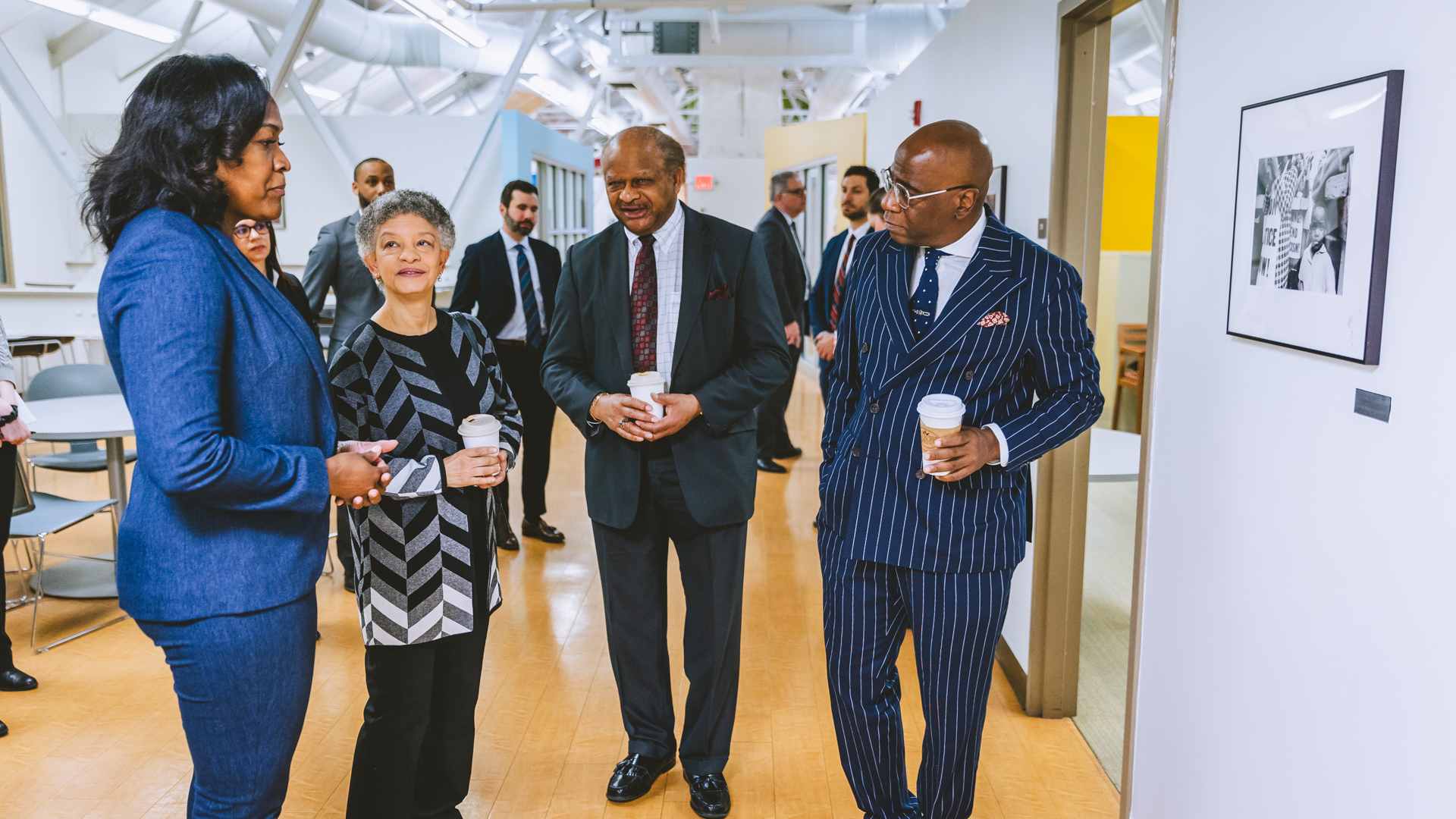Boston Fed president meets with local leaders in CT to discuss wealth gaps, economic challenges 
Nonprofit and business leaders share efforts to address wealth disparities, support workforce 
Federal Reserve Bank of Boston President Susan M. Collins traveled to Connecticut on Thursday and heard from community and business leaders about the state’s economic challenges and progress, as well as the impact of persistent wealth gaps.
During a meeting in New Haven, Collins said long-term success in addressing those wealth disparities can’t happen without ongoing collaboration.
“There’s a lot to be done, and we each bring different ideas, thoughts, and understandings to the table,” she said. “Unless we work together, we’re not going to be successful in terms of moving things forward.”
In New Haven, Collins toured the Connecticut Center for Arts and Technology with Erik Clemons, the organization’s president and CEO. The center offers afterschool enrichment programs in areas such as the arts and entrepreneurship. It also provides free job training programs for adults seeking employment in the culinary arts and bioscience.
Collins later joined a roundtable discussion in neighboring Hamden at the Connecticut Community Outreach Revitalization Program, or ConnCORP, which Clemons also leads. There, Collins heard from people working to address the state’s wealth disparities, including steering committee members of the Boston Fed’s new Wealth Solutions Accelerator. The initiative aims to provide underrepresented New Englanders with effective strategies to build and retain wealth.
Collins said wealth gaps can create barriers to an economy that works for everyone and the Federal Reserve’s mandate to promote maximum employment.
“Maximum employment is (how) we foster a vibrant economy,” she said. “We know that for many people, there are real barriers to participation, and wealth is a huge part of that.”
Community, nonprofit leaders discuss efforts to address wealth disparities
During the discussion at ConnCORP, community and nonprofit leaders spoke about the long history of regional and statewide wealth disparities, as well as efforts to address these gaps.
OrLando Yarborough III, who directs ConnCAT’s bioscience training programs, emphasized the importance of creating career pipelines and entry-level job opportunities for underrepresented communities. Yarborough said bioscience and biotech have numerous entry points for people of varying skill levels, and we need to help prepare people for those opportunities.
He added that someone entering the workforce needs more than just technical skills. They also need general “soft skills,” such as communication skills, as well as professional development opportunities and support services.
8 images

Andréa Comer, chief of staff for the state treasurer, discussed how Connecticut’s “Baby Bonds” program helps families build wealth by investing $3,200 in a trust for each child whose birth was covered by the state’s Medicaid program. That’s about 15,000 children annually, she said. Once they become adults, they can use the funds to buy a home in Connecticut, start a business, pay for higher education, or save for retirement.
“Talking to some of the parents … they now have hope,” Comer said. “They’re now thinking, ‘I might actually be able to plan for my child to go to college or buy a house.’”
Connecticut business leaders discuss workforce shifts, impacts of inflation
In Hartford, Collins joined a roundtable discussion with business leaders from a variety of industries, including finance, insurance, healthcare, technology, and manufacturing. The meeting was organized in partnership with the MetroHartford Alliance.
Bimal Patel, president of Hartford Hospital and a senior vice president of Hartford HealthCare, said the COVID-19 pandemic raised awareness about workforce inequities. He said his company has since increased efforts to address disparities in the healthcare workforce and in wages and business opportunities.
“One example: Prior to the pandemic, our minority supplier portfolio was barely $25 million a year. Today, we are expecting it to be $250 million,” he said.
Max Kothari, the CEO of Hartford-based company Express Kitchens, said inflation has impacted the day-to-day lives of Connecticut residents in many ways, from how much families spend on groceries to how much businesses spend on shipping. Kothari, a member of the Boston Fed’s New England Advisory Council and the Hartford Chamber of Commerce, added that some local small businesses are struggling to meet financing requirements.
“They have to (find) an alternate path,” he said. “It’s not a normal process.”
Chris DiPentima, the president and CEO of the Connecticut Business and Industry Association, said Connecticut’s labor market has softened over the last three months. For instance, he said, state figures recently showed 86,000 job openings and 85,000 people looking for work. That nearly one-to-one match is “huge,” DiPentima said.
“There’s more people getting engaged (in the workforce),” he said, "We can now match these folks to a job or training opportunity.”
Media Inquiries? 
Contact our media relations team. We connect journalists with Boston Fed economists, researchers, and leadership and a variety of other resources.

 About the Authors
About the Authors
Amanda Blanco is a member of the communications team at the Federal Reserve Bank of Boston.
Email: Amanda.Blanco@bos.frb.org
Site Topics
Keywords
- Connecticut ,
- New England region ,
- wealth inequality ,
- workforce development ,
- Susan M Collins






